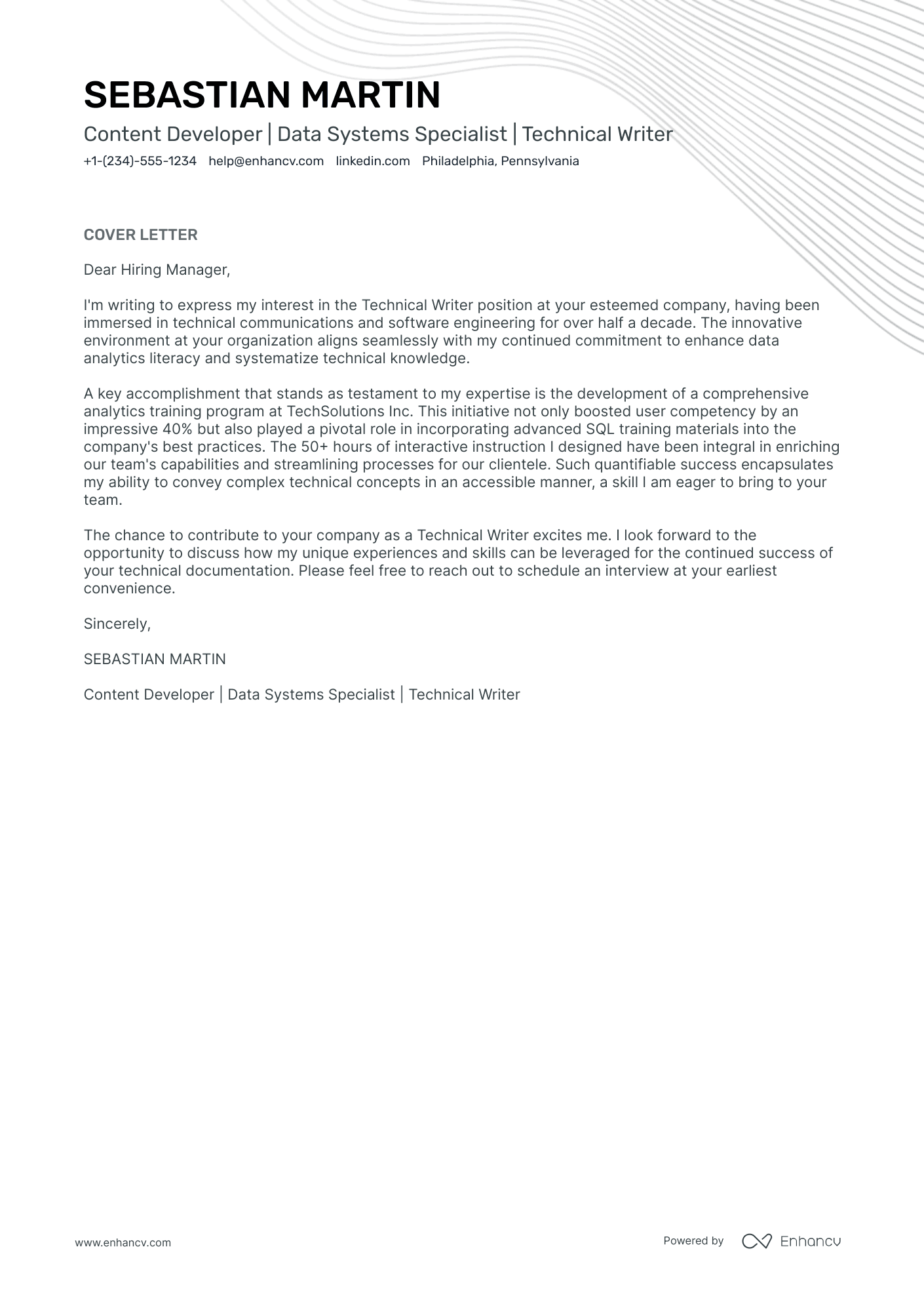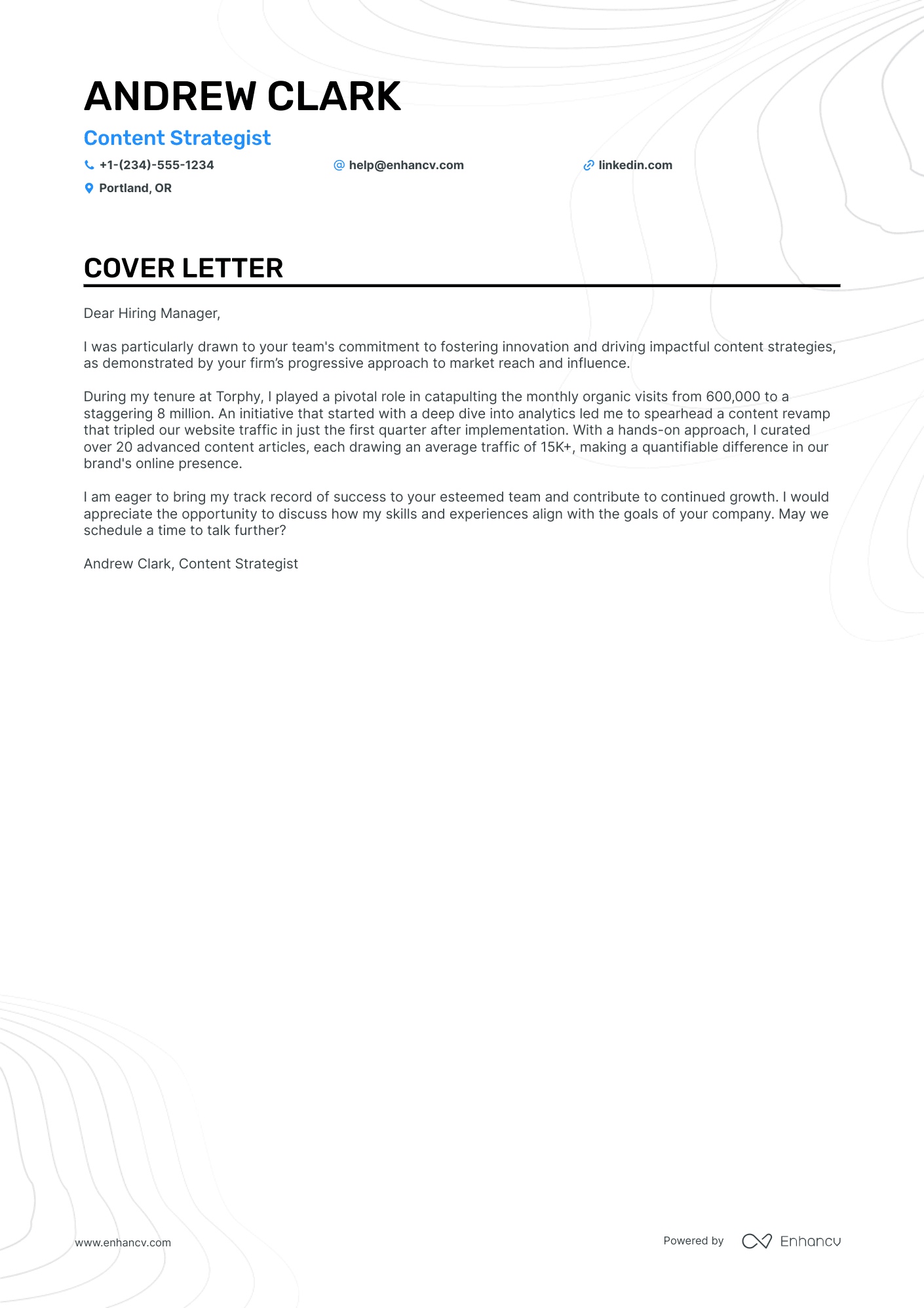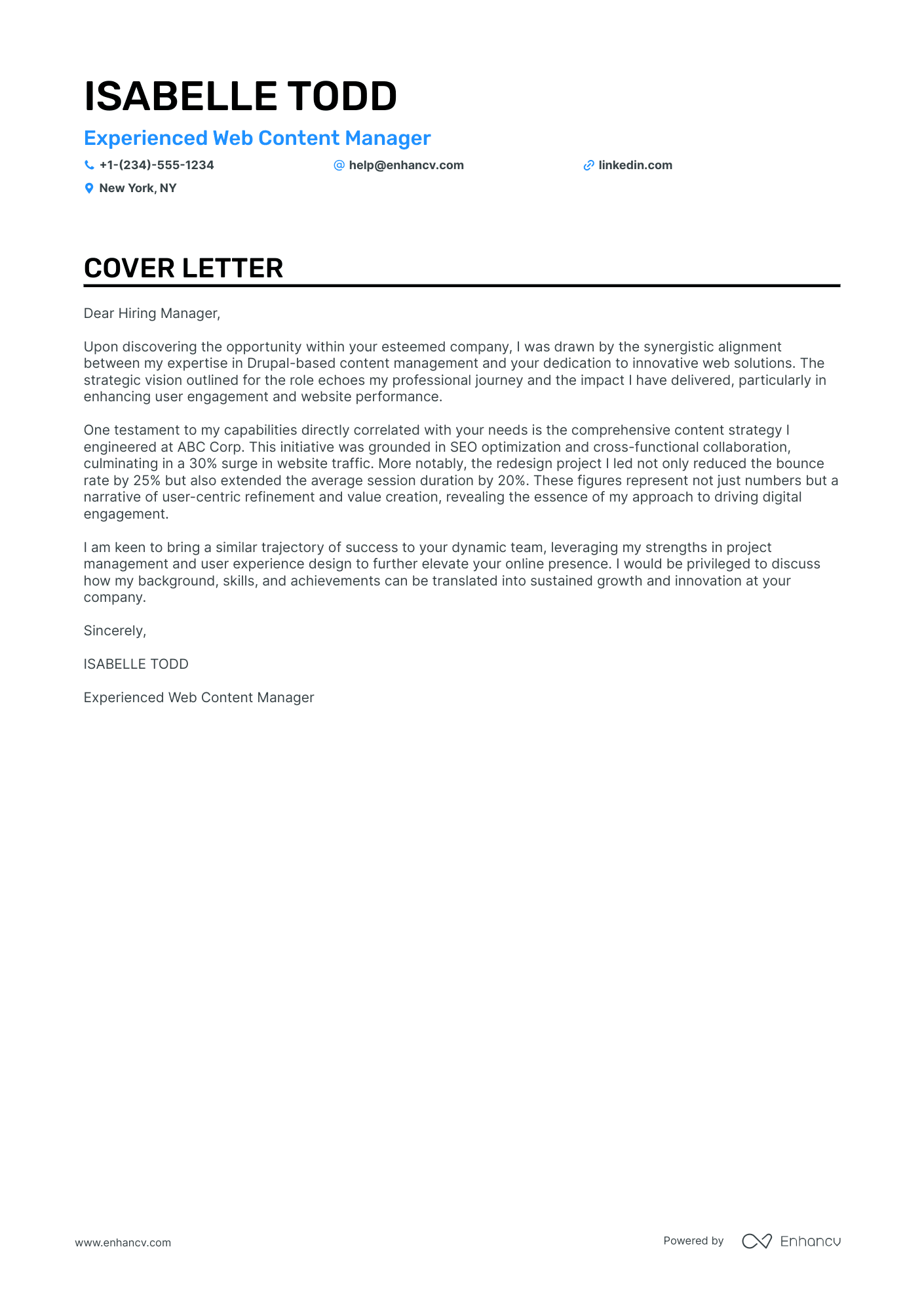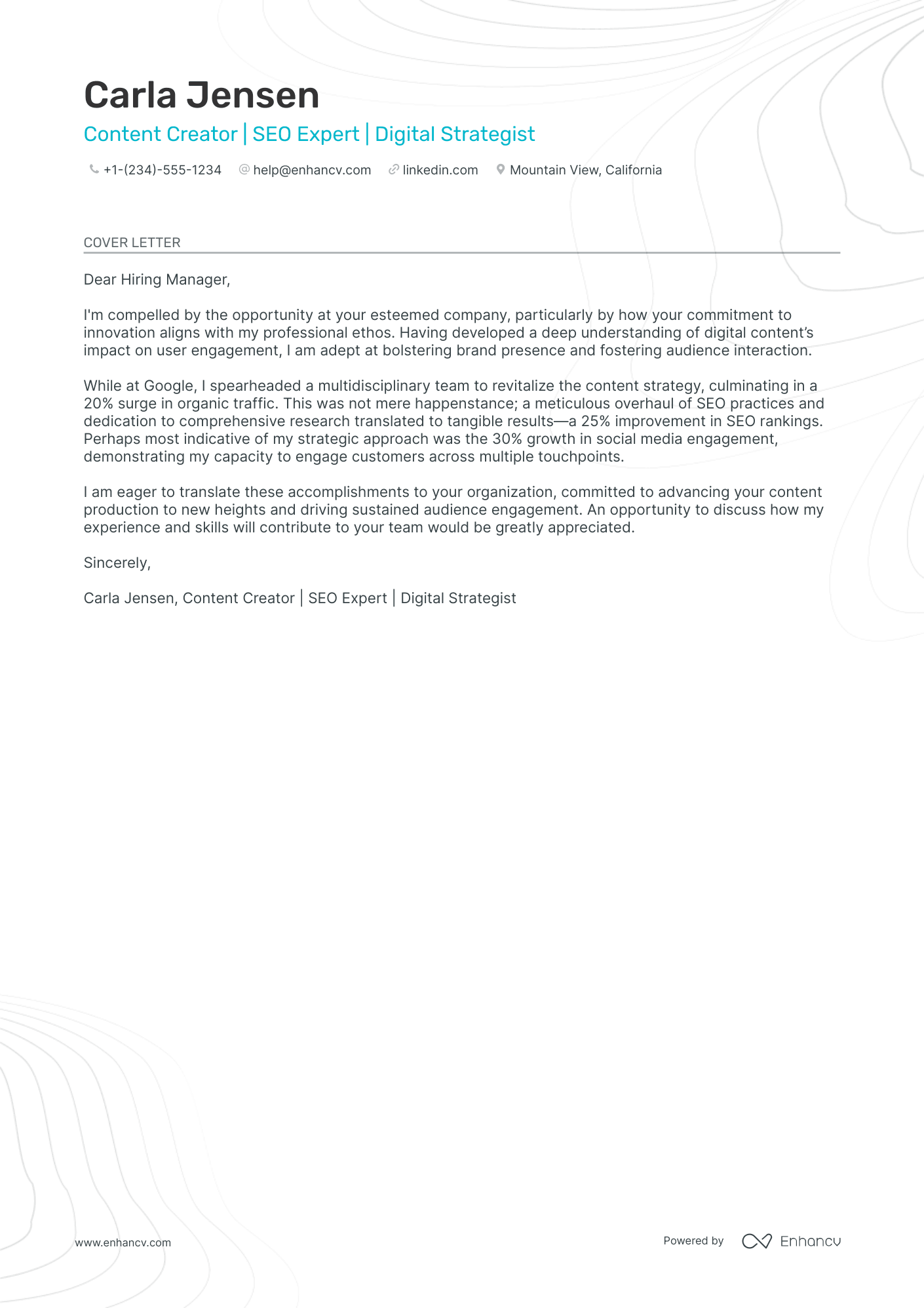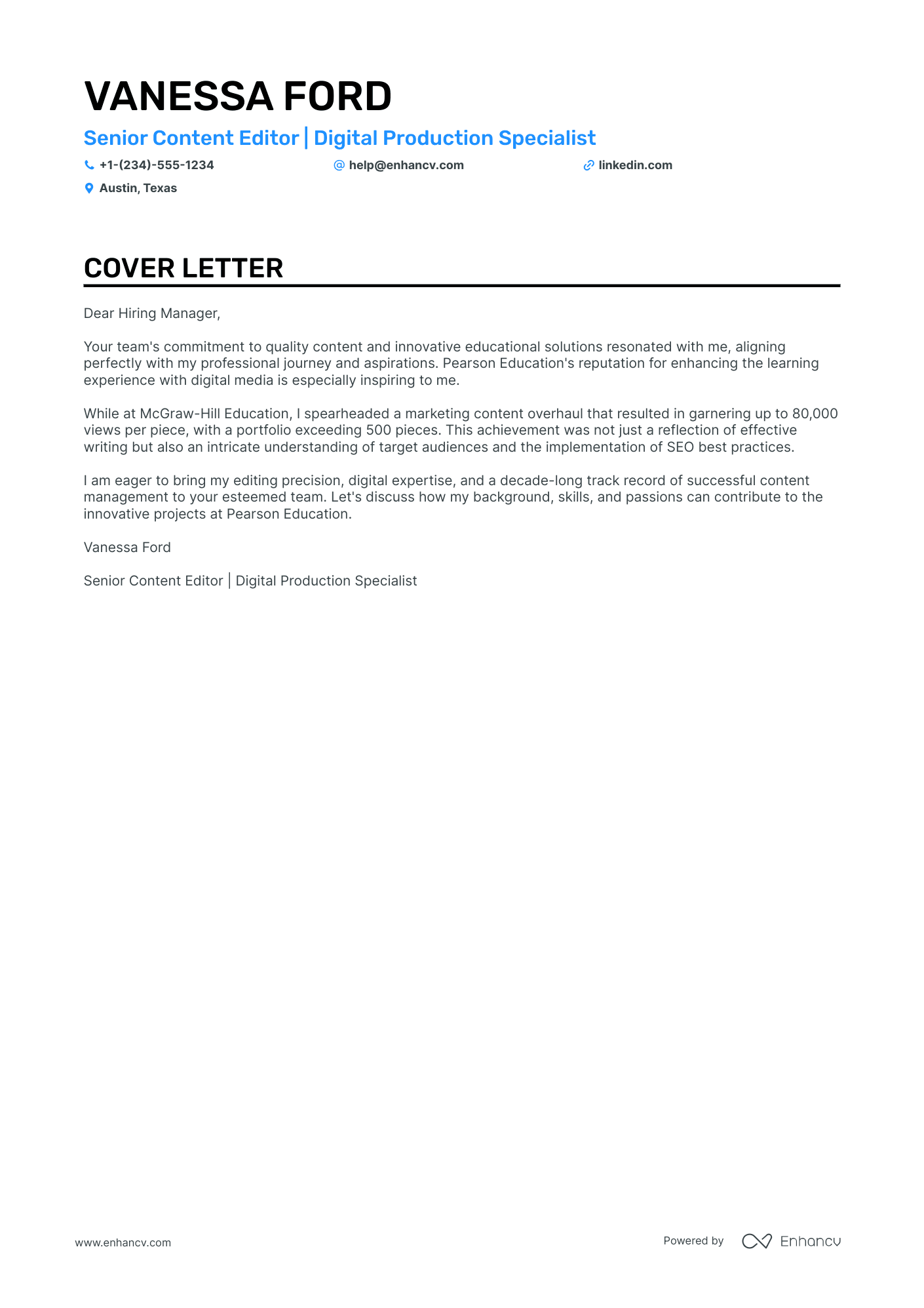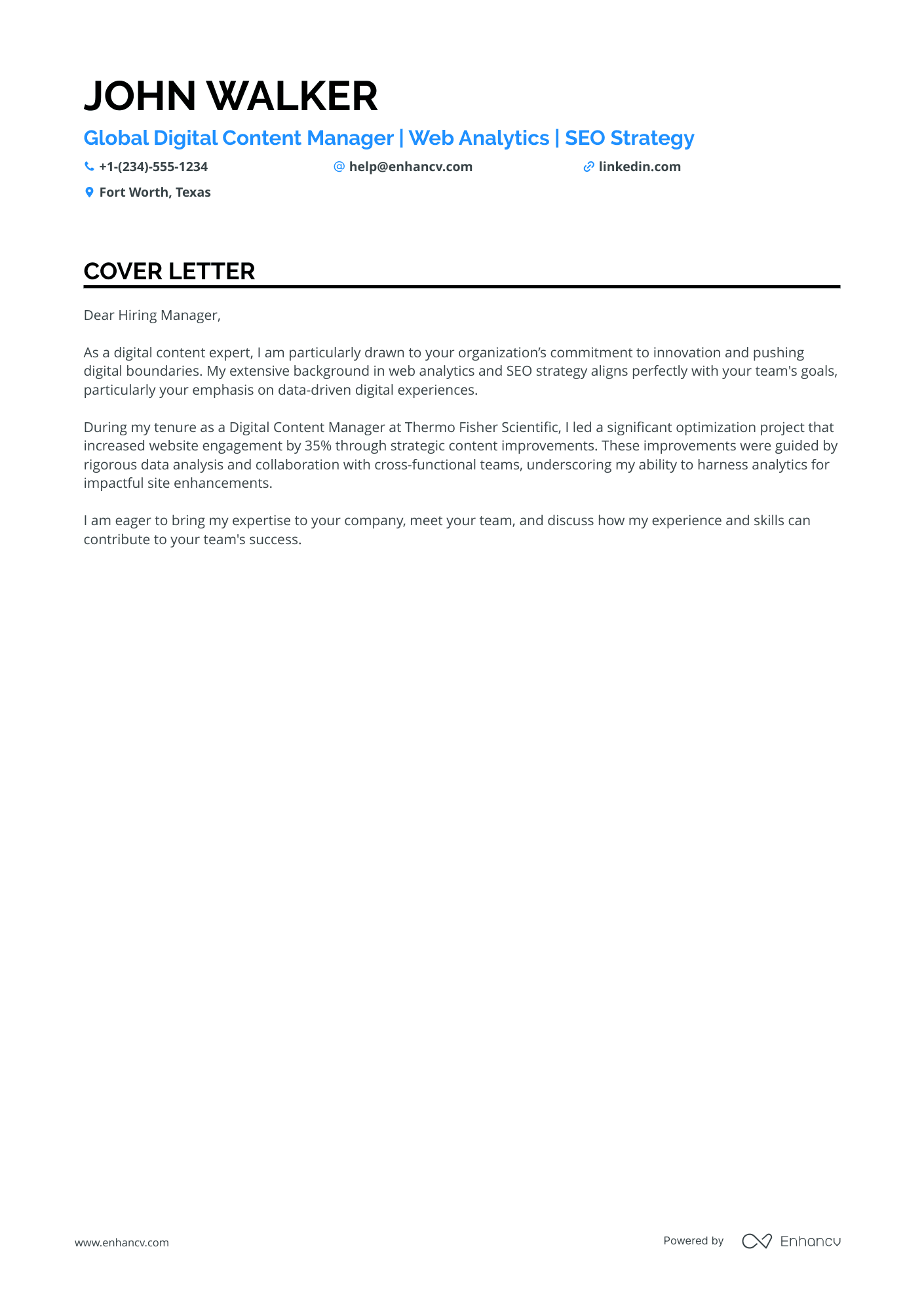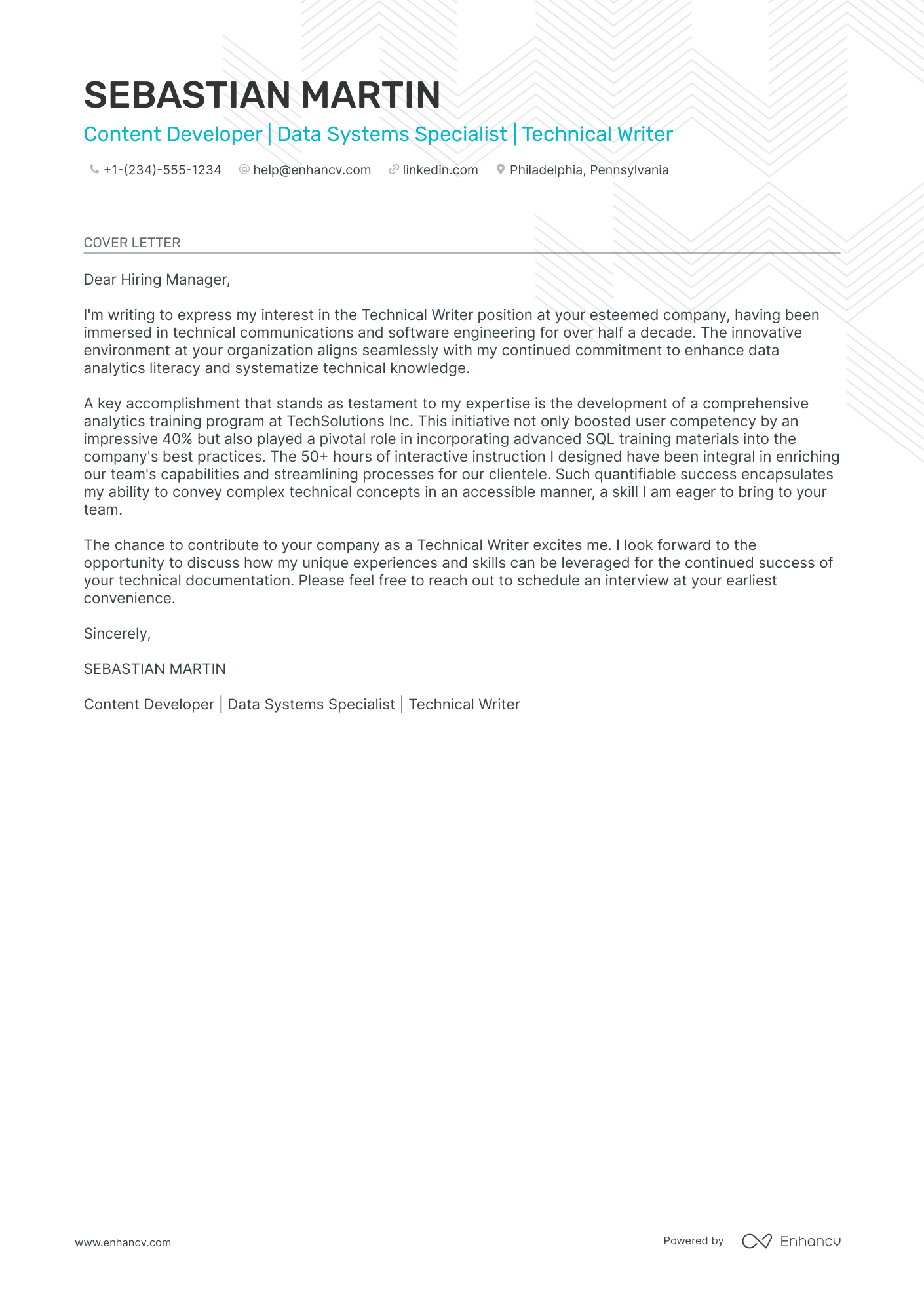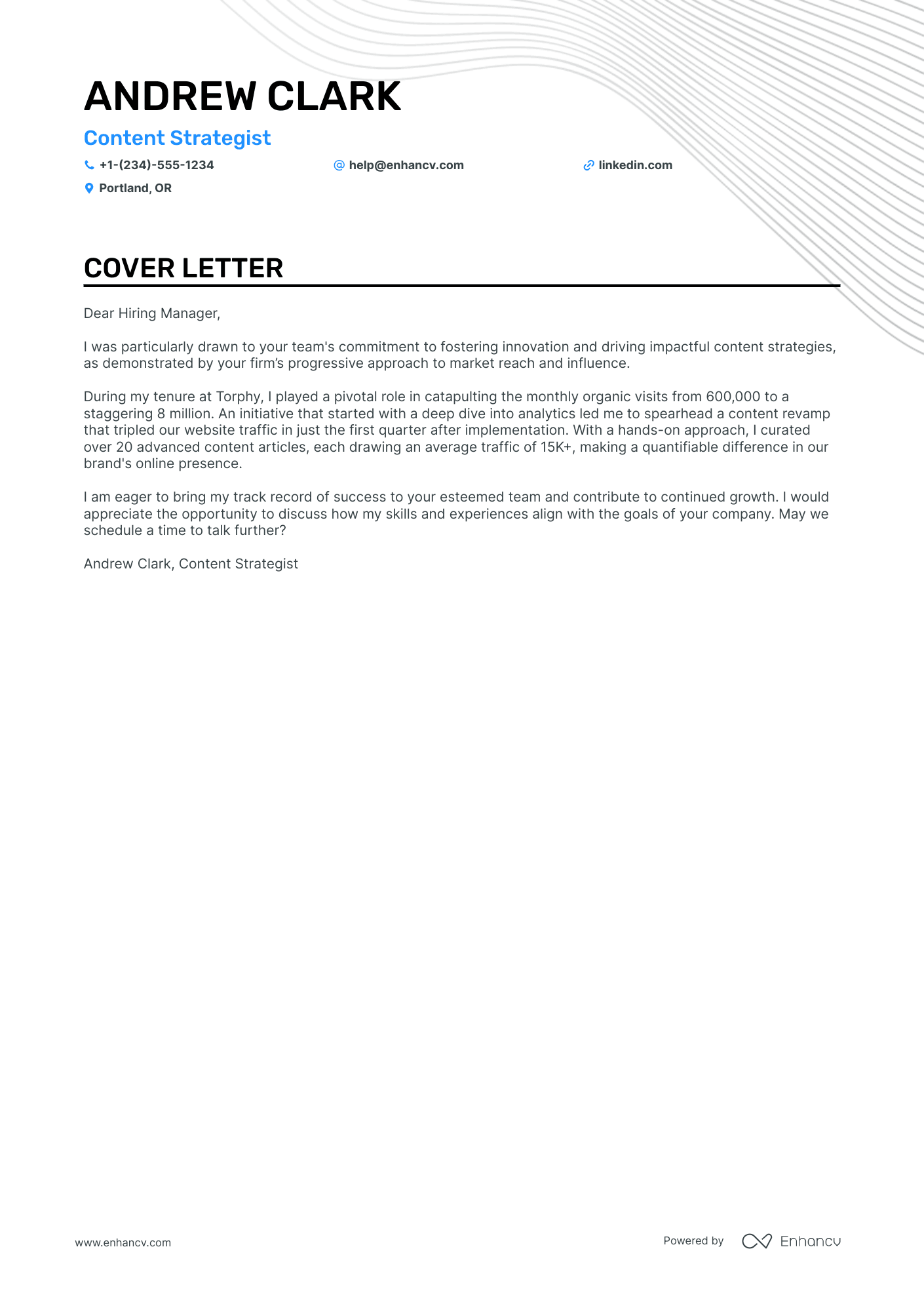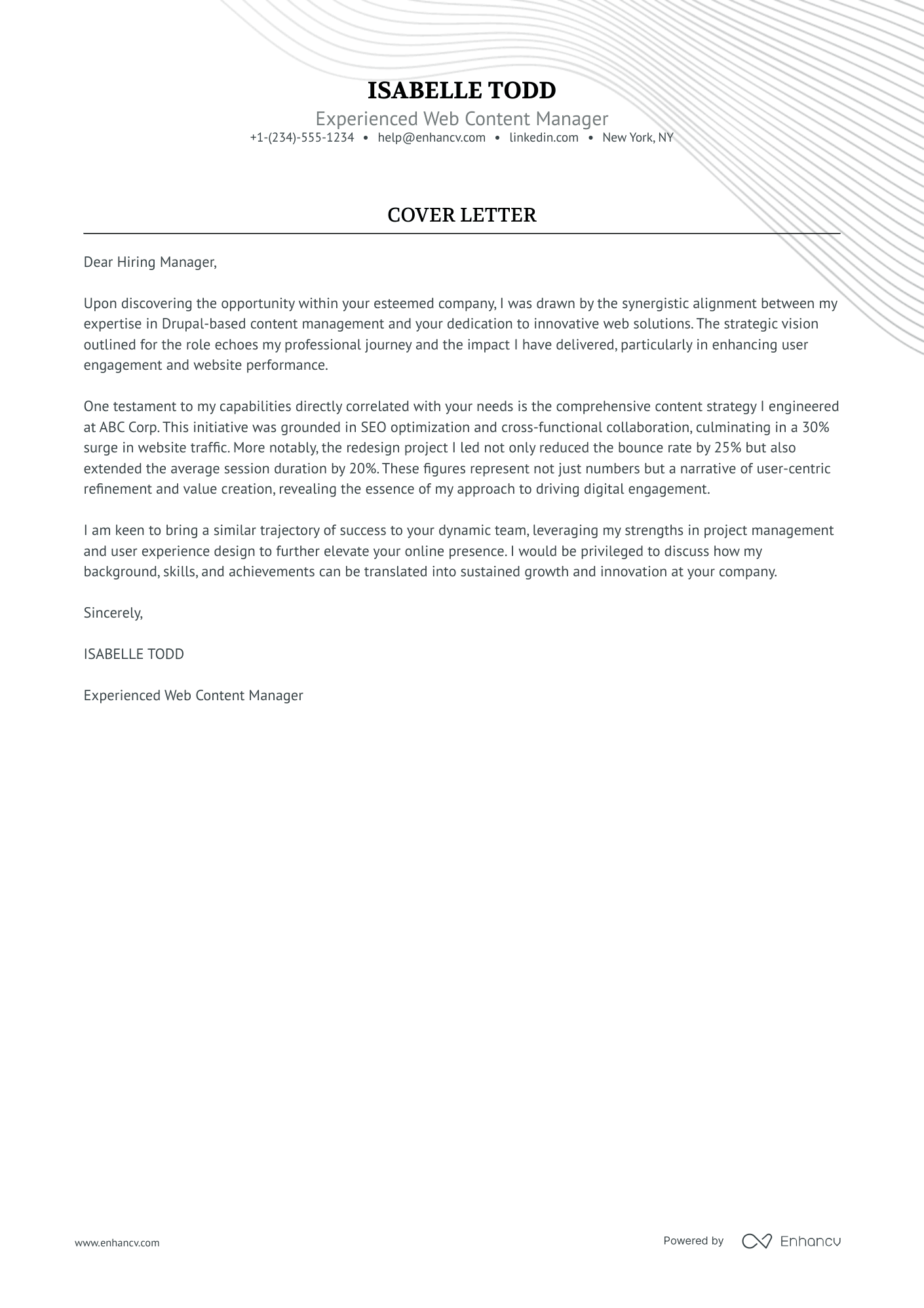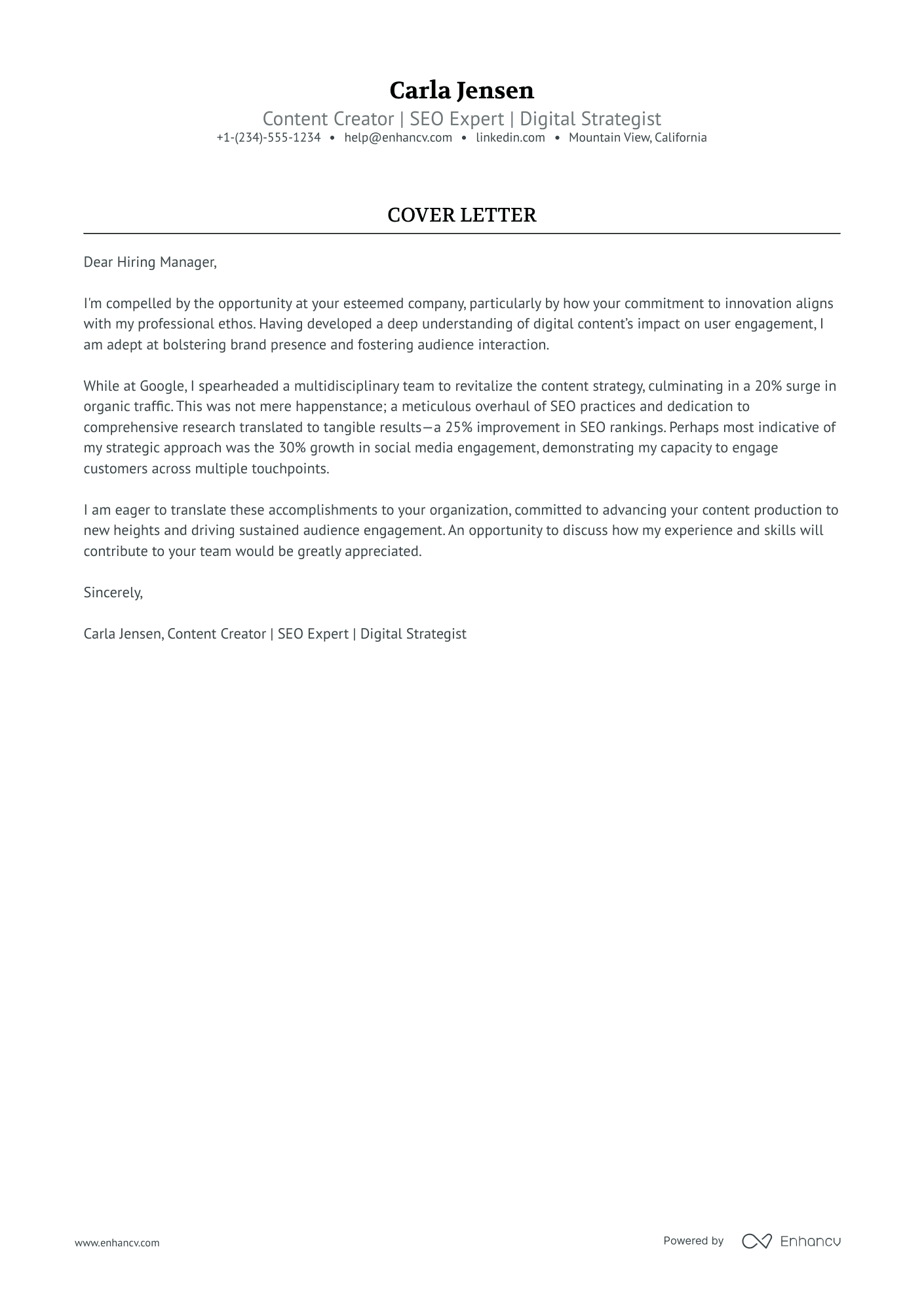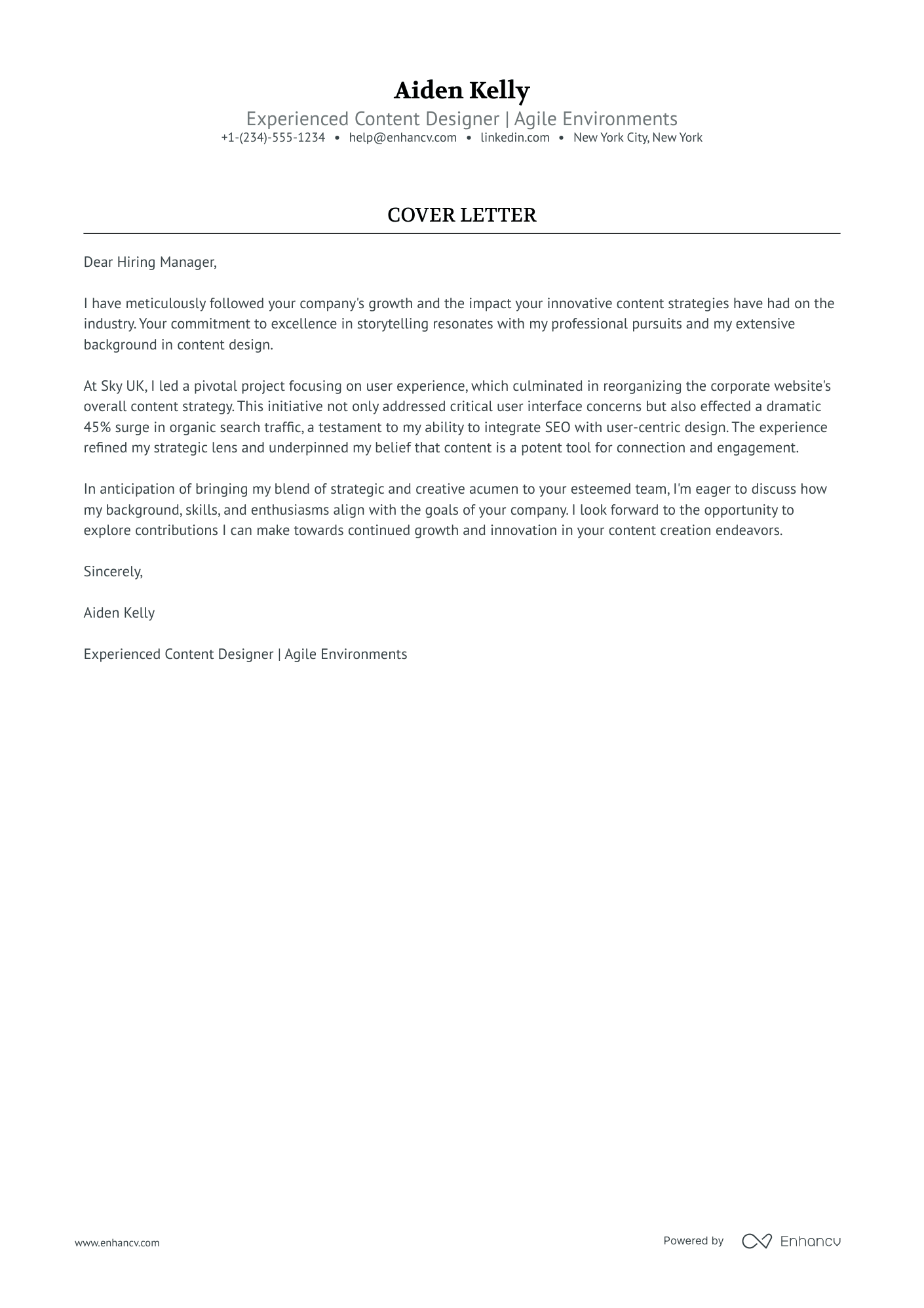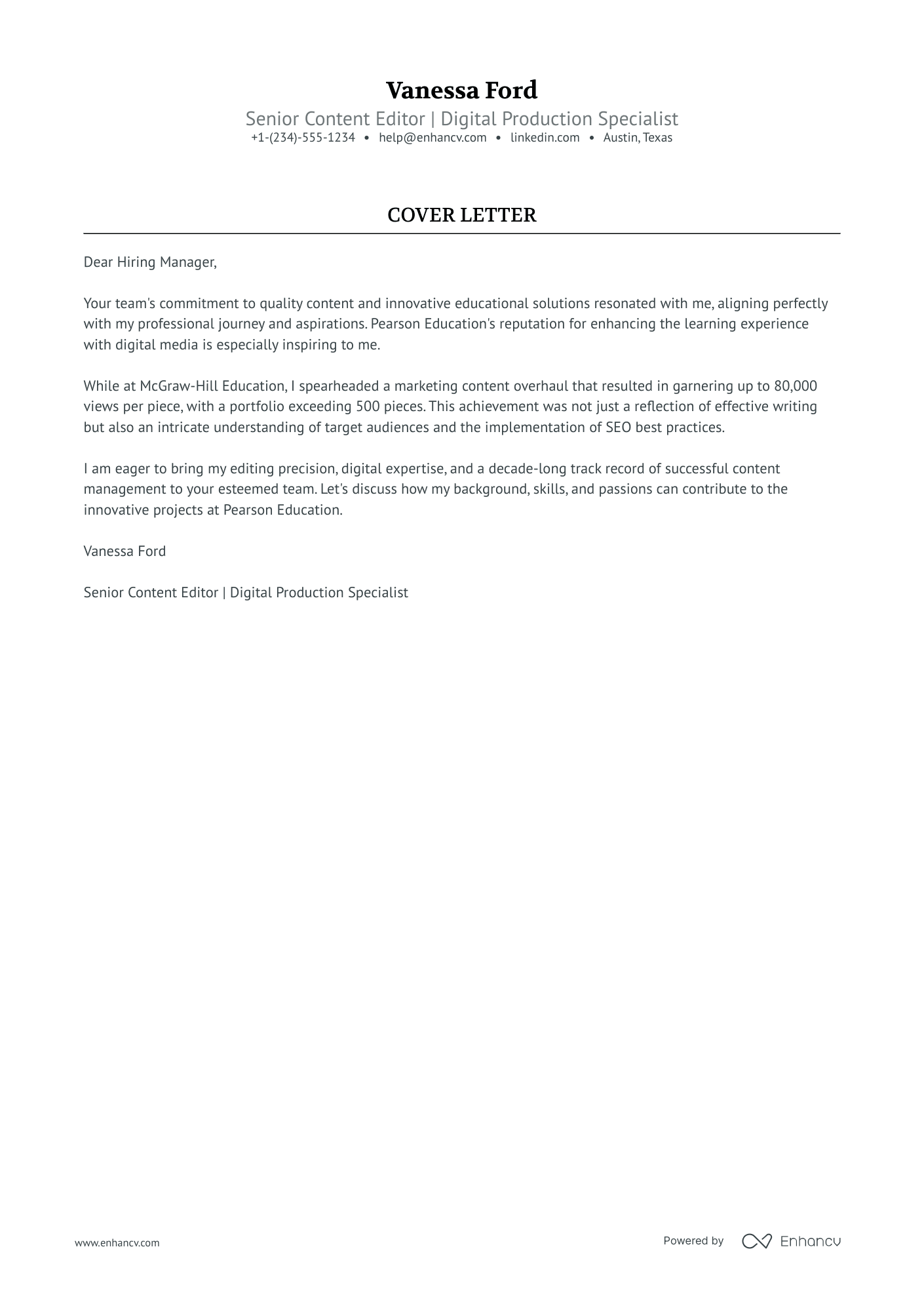Embarking on the job hunt, you've likely discovered that a standout content manager cover letter is your golden ticket to catching an employer's eye. It's not just about rehashing your resume; it's your chance to weave a compelling narrative around your proudest professional triumph. Striking a balance between formality and originality, without resorting to tired clichés, can be tricky. And fitting that powerful story onto just one page? That's the art we're here to master together.
- Personalize the greeting to address the recruiter and your introduction that fits the role;
- Follow good examples for individual roles and industries from job-winning cover letters;
- Decide on your most noteworthy achievement to stand out;
- Format, download, and submit your content manager cover letter, following the best HR practices.
Use the power of Enhancv's AI: drag and drop your content manager resume, which will swiftly be converted into your job-winning cover letter.
If the content manager isn't exactly the one you're looking for we have a plethora of cover letter examples for jobs like this one:
- Content Manager resume guide and example
- Digital Marketing Manager cover letter example
- Brand Marketing Manager cover letter example
- Assistant Community Manager cover letter example
- SEO Manager cover letter example
- Podcaster cover letter example
- Product Marketing Manager cover letter example
- Commercial Director cover letter example
- Branding Manager cover letter example
- Field Marketing Manager cover letter example
- Communications Specialist cover letter example
Drop your resume here or choose a file.
PDF & DOCX only. Max 2MB file size.
Content manager cover letter example
Jonathan Wright
Columbus, OH
+1-(234)-555-1234
help@enhancv.com
- Emphasize relevant experience: Mentioning specific figures, such as increasing brand visibility and engagement by 50%, showcases measurable accomplishments that are attractive to employers and demonstrates the candidate's impact at a high-profile company.
- Illustrate leadership and teamwork: Highlighting experience in leading a team of content creators and optimizing workflow speaks to the candidate’s management skills, an important aspect for a role that may involve overseeing a team.
- Focus on relevant skills and results: Discussing SEO best practices and an increase in organic traffic directly relates to the core responsibilities of a Content Marketing Manager, demonstrating the candidate's relevant expertise and successful application of those skills.
What are the basics of the design or format of your content manager cover letter?
To start, here's a reminder for you: the Applicant Tracker System (or software that is used to assess candidate profiles), won't be reading your content manager cover letter.
Recruiters enjoy reading content manager cover letters with a standardized format that uses:
- the same font as the resume (e.g. modern ones like Raleway or Volkhov are prefered over the clichéd Times New Roman or Arial);
- single spacing to keep the content concise and organized (this is all ready for you in our cover letter templates);
- a one-inch margin to wrap around the text, like in our cover letter builder;
- PDF as a file format, as it allows your design (and visual element) to stay the same.
Finally, we can't go on without mentioning the key sections of your content manager cover letter.
In the top one-third, make sure to include a header (with your contact information, name, role, and date), a salutation, and an introduction.
Next, follows the heart and soul of your content manager cover letter or its body.
End your content manager cover letter with a closing paragraph and, if you wish, a signature.
Writing cover letters just got easier. Use our free cover letter generator to create yours instantly.
The top sections on a content manager cover letter
- Header: The header should include the applicant's contact information, making it easy for the recruiter to reach out, and it should be professional to set the right first impression for the content manager role.
- Opening Greeting: The greeting should be personalized with the recruiter's name if possible, showing attention to detail and the ability to personalize content, which is crucial for a content manager.
- Introduction: This section should hook the recruiter by briefly stating the applicant's passion for content creation and management, as well as their understanding of the company's content needs, demonstrating alignment with the company’s brand and audience.
- Body Paragraphs: These sections should showcase previous content projects, mastery of content management systems, SEO knowledge, and metrics of success, as they are the core competencies a recruiter is looking for in a content manager.
- Closing Paragraph: The closing should reiterate the applicant's interest in the position, mention their enthusiasm for contributing to the company's content goals, and include a call to action, inviting the recruiter to continue the conversation.
Key qualities recruiters search for in a candidate’s cover letter
- Demonstrated experience with content management systems (CMS): Recruiters look for familiarity with platforms like WordPress, Drupal, and Joomla because managing and publishing content effectively is central to the role.
- Strong writing and editing skills: Content managers need to create and curate engaging, accurate, and clear content, so command of language is crucial.
- SEO and analytics proficiency: Knowledge of search engine optimization practices and the ability to interpret data analytics help in creating content strategies that increase visibility and engagement.
- Project management experience: Being able to coordinate with different departments, manage timelines, and oversee content schedules is important for keeping projects on track.
- Social media expertise: An understanding of social platforms and strategies for content distribution is important to expand reach and engagement.
- Creativity and adaptability: The ability to generate innovative ideas for content and adapt to changing trends and technologies ensures the content remains relevant and appealing.
What matters most when tailoring your content manager cover letter salutation
Your content manager cover letter greeting should feel welcoming to recruiters.
Use their first name (e.g. "Dear Marshall" or "Dear Sara"), if you've previously been in touch with the hiring manager and are on a more friendly basis.
If this is the first time you're contacting the recruiters, start your content manager cover letter with:
- their last name (e.g. "Dear Ms. Ali" or "Dear Mr. Stevens") - look up who's the hiring manager for the role on social media or the company website;
- generalized greeting (e.g. "Dear HR Team") - just don't use "To whom it may concern" or "Dear Sir/Madam".
List of salutations you can use
- Dear Hiring Manager,
- Dear [Company Name] Recruitment Team,
- Dear [Department] Team,
- Dear Mr./Ms. [Last Name],
- Dear [First Name] [Last Name],
- Dear [Job Title] Search Committee,
Introducing your profile to catch recruiters' attention in no more than two sentences
The introduction of your content manager cover letter is a whole Catch 22 .
You have an allocated space of no more than just a paragraph (of up to two sentences). With your introduction, you have to stand out and show why you're the best candidate out there.
Set out on a journey with your content manager cover letter by focusing on why you're passionate about the job. Match your personal skills and interests to the role.
Another option for your content manager cover letter introduction is to show you're the ideal candidate. Write about how your achievements and skills are precisely what the company is looking for.
However you decide to start your content manager cover letter, always remember to write about the value you'd bring about. Making it both tangible (with your metrics of success) and highly sought out.
The middle or body of your content manager cover letter body: a great instrument to tell a story
Now that you've set the right tone with the greeting and introduction of your content manager cover letter, it's time to get down to business.
Hear us out, the body of your content manager cover letter is the best storytelling instrument you have, in your job-hunting arsenal.
Writing the next three to six paragraphs, take the time to reassess the advert to discover job-crucial requirements.
Next, choose one accomplishment that covers those key skills and talents.
Use precisely that achievement to tell an exciting story of how you match the ideal candidate profile.
In the undertones of your story or content manager cover letter body, hint at the difference you'd make and sell your application as the perfect one for the job.
Two ideas on how to end the final paragraph of your content manager cover letter
Closing your content manager cover letter, you want to leave a memorable impression on recruiters, that you're a responsible professional.
End your cover letter with how you envision your growth, as part of the company. Make realistic promises on what you plan to achieve, potentially, in the next six months to a year.
Before your signature, you could also signal hiring managers that you're available for the next steps. Or, a follow-up call, during which you could further clarify your experience or professional value.
What could you write about in your content manager cover letter when you have no experience
Candidates with zero professional experience often struggle to write their content manager cover letter.
You may lack experience, but your application could still be impressive when you focus on your strengths.
Consider your most relevant talents (and/or one achievement) that align with the role and help you stand out.
Perhaps you spent every summer volunteering at your local dog pound - think of the job-relevant skills this experience taught you.
Sharing your tangible career goals is another good strategy to stand out.
Key takeaways
Within this Enhancv guide, we've provided you with plenty of advice and inspiration on writing your content manager cover letter:
- Always make sure your content manager cover letter is tailored to the role you're applying for to make a good impression on recruiters;
- In your content manager cover letter include a header (with your name, the role you're applying for, date, and contact details) and an introduction of up to two sentences that highlight your key accomplishment or why you'd fit the role;
- Focus your content manager cover letter body on one sole achievement through your career and all the valuable lessons, skills, and know-how you've learned (that are relevant to the role);
- Ensure your content manager cover letter closing statement isn't generic and includes either a call to action or a promise;
- If you lack professional experience, shift recruiters' focus to a relevant achievement (thanks to your academic or versatile experience) or toward your dreams and goals for professional growth.
Content Manager cover letter examples
By Role
Content Developer
Content Strategist
Web Content Manager
Content Creator
Content Designer
Content Editor
Digital Content Manager
- Alignment with Organization's Goals: The cover letter highlights the candidate's attraction to the organization's innovation and digital focus, demonstrating a strong alignment with the company's mission and values.
- Quantifiable Achievements: The letter provides specific metrics, such as the 35% increase in website engagement, which showcases the candidate's ability to produce measurable outcomes.
- Relevant Experience: The mention of leading a significant optimization project at a previous role emphasizes relevant experience in managing and improving digital content strategies.
- Collaborative Skills: By emphasizing collaboration with cross-functional teams, the letter highlights an essential skill in digital roles, demonstrating the ability to work well with others for a common goal.
